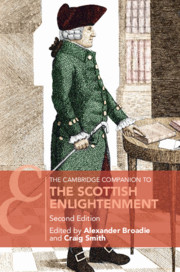Book contents
- The Cambridge Companion to the Scottish Enlightenment
- Series page
- The Cambridge Companion to the Scottish Enlightenment
- Copyright page
- Contents
- Contributors
- Acknowledgements
- Chronology of Events Relating to the Scottish Enlightenment
- Introduction
- 1 Several Contexts of the Scottish Enlightenment
- 2 Religion and Rational Theology
- 3 The Human Mind and Its Powers
- 4 Anthropology
- 5 Science in the Scottish Enlightenment
- 6 Scepticism and Common Sense
- 7 Moral Sense Theories and Other Sentimentalist Accounts of the Foundations of Morals
- 8 The Political Theory of the Scottish Enlightenment
- 9 Political Economy
- 10 Natural Jurisprudence and the Theory of Justice
- 11 Legal Theory in the Scottish Enlightenment
- 12 Sociality and Socialisation
- 13 Historiography
- 14 Art and Aesthetic Theory
- 15 Literature and Sentimentalism
- 16 The Impact on America
- 17 The Nineteenth-Century Aftermath
- Select Bibliography
- Index
- Series page
7 - Moral Sense Theories and Other Sentimentalist Accounts of the Foundations of Morals
Published online by Cambridge University Press: 04 October 2019
- The Cambridge Companion to the Scottish Enlightenment
- Series page
- The Cambridge Companion to the Scottish Enlightenment
- Copyright page
- Contents
- Contributors
- Acknowledgements
- Chronology of Events Relating to the Scottish Enlightenment
- Introduction
- 1 Several Contexts of the Scottish Enlightenment
- 2 Religion and Rational Theology
- 3 The Human Mind and Its Powers
- 4 Anthropology
- 5 Science in the Scottish Enlightenment
- 6 Scepticism and Common Sense
- 7 Moral Sense Theories and Other Sentimentalist Accounts of the Foundations of Morals
- 8 The Political Theory of the Scottish Enlightenment
- 9 Political Economy
- 10 Natural Jurisprudence and the Theory of Justice
- 11 Legal Theory in the Scottish Enlightenment
- 12 Sociality and Socialisation
- 13 Historiography
- 14 Art and Aesthetic Theory
- 15 Literature and Sentimentalism
- 16 The Impact on America
- 17 The Nineteenth-Century Aftermath
- Select Bibliography
- Index
- Series page
Summary
Interest in what has been called a ‘moral sense’ originated in the late 17th century, as part of a philosophical debate about humans’ moral nature. Participants in the debate agreed on rejecting four views of human morality commonly held at the time. They found (1) the Cambridge Platonists’ moral rationalism and (2) Gershom Carmichael’s (and others’) natural law theories of morality too remote from actual processes of moral judgment and decision making; (3) they rejected Thomas Hobbes’ psychological egoism as excessively reductive; and (4) they found moral relativism objectionable on normative grounds, since they were committed to the defence of moral universalism. The article provides an overview over the history of moral sense theories. It briefly presents the versions developed by Thomas Burnet, Anthony Ashley-Cooper, 3rd Earl of Shaftesbury, Francis Hutcheson, Joseph Butler, and Henry Home Lord Kames, and then provides a brief account of the moral theories by David Hume and Adam Smith who, while adherents of moral sentimentalism, rejected the assumption of a moral sense.
Keywords
- Type
- Chapter
- Information
- The Cambridge Companion to the Scottish Enlightenment , pp. 131 - 150Publisher: Cambridge University PressPrint publication year: 2019
- 1
- Cited by

